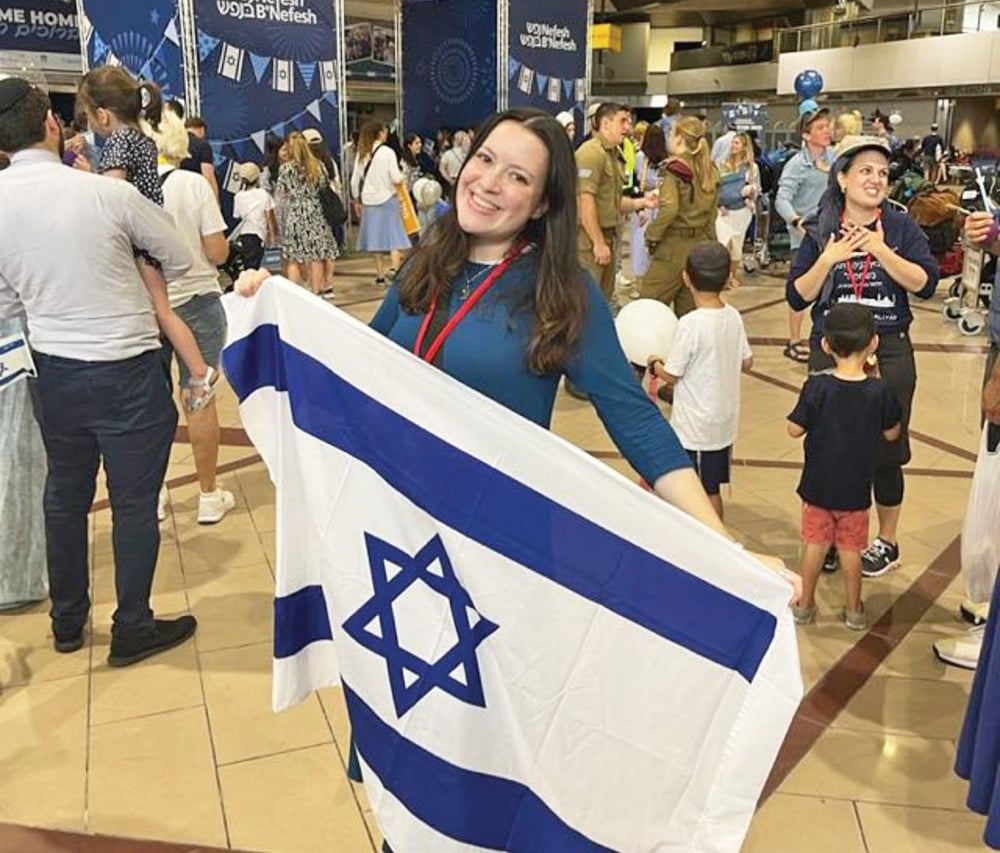
The Jewish Link first interviewed Dalia Adams on the Aug. 15 Nefesh B’Nefesh (NBN) charter aliyah flight to Israel. Adams’ sheer joy and excitement about starting life in Israel was palpable.
Barely two months later, The Link reached out to Adams to see how she was adapting and adjusting under what were obviously very different circumstances from what she had been expecting upon her aliyah.
Adams, originally from East Brunswick and a graduate of Ma’ayanot and Stern College, is currently a madricha at Machon Maayan, where she herself went to seminary. She is also a student at the Wurzweiler School of Social Work-Yeshiva University in its Israel program.
Adams explained that because it was Shabbat/Simchat Torah when the Hamas attack occurred, it took a while until she learned the gravity of the situation. She was spending the holiday with a friend in an apartment in Baka, Yerushalyim. At about 8 a.m., Adams was awoken by a siren.
During the next couple of hours the sirens were fairly consistent and, concerned that their apartment did not have a mamad (safe room), Adams and her friend ultimately made their way to shul. Adams recalls that while outside she could see smoke in the sky from the Iron Dome and hear sirens, but that everyone on the streets just continued walking.
At shul, davening took place in the bomb shelter. Musaf, Adams estimated, took seven minutes. People had guns and were on their phones. It was then that Adams began to realize that some type of large incident was taking place. After Musaf and yet another siren, without giving much detail, security personnel told the shul congregants that they were to go home. They were advised that if a siren sounded on their walk, they should get down and put their hands over their head.
At lunch, Adams and her friends could only speculate as to what was happening. They were horrified to ultimately learn from someone in the building that Hamas had attacked Israel.
Adams spoke about some of the changes that she and the staff and students of Machon Maayan have faced since the start of the war.
Adams’ social work studies have been delayed. The field work component of her social work program, which was scheduled to start the week of Oct. 15, began the week of Oct. 22, but her actual assignments will be dependent upon the evolving circumstances in the country. Adams’ social work classes, held at Hebrew University, have also been postponed and are currently scheduled to start on Nov. 5.
Machon Maayan, located in Givat Washington in central Israel, has been temporarily relocated to Ben Shemen, a youth village, also in central Israel, which is home to students in grades 1-12. The reason for the relocation was so that Machon Maayan could hold regularly scheduled programming and also be involved in the many chesed opportunities available at Ben Shemen.
As Adams explained: “Ben Shemen is located only a few kilometers away from the Iron Dome. It is a very safe space and there were no sirens [last] week.” Commenting on all of the chesed opportunities at Ben Shemen, Adams noted, “It is such a blessing for us, because one of the things about not being in the army is that you feel helpless, and you just want to do more.”
For example, Adams said, “We work with children from Ashkeleon who Ben Shemen has taken in due to the war. We bake with them and do arts and crafts with them and it’s very nice. Last night we had a kumzitz; we sang and had candles set up, and it was very therapeutic for all of them.”
Adams also noted how impressed she is at how Machon Maayan is caring for its students.
“The staff has really been incredible,” she said. “Many of the Machon Maayan staff lived near the campus and uprooted their lives to not only make sure that the students have regularly scheduled programming, but also to closely monitor the students’ emotional needs.”
Adams continued, “Some of the teachers were actually called up, so we had to rearrange things a little bit with other teachers taking over and shifting some classes.” One thing Machon Maayan has implemented, which Adams highlighted as particularly meaningful, is group davening. “It has been very good for some of the students, and for me as well, to daven together.”
Overall, Adams noted that the “move has actually been a really positive experience as the staff and students have all really bonded. Although we miss being on campus, I think that this is the best situation for us.” As for Adams herself, because her studies have been temporarily put on hold, she has been assisting the students as best she can in her capacity as a madricha.
The difficult thing for Adams is being so far from her parents, siblings and nephews. But, Adams remarked, although her parents are of course very worried about her, they are also extremely supportive. “Any small thing I get annoyed about because my emotions are all over the place, my parents say ‘okay, that is really upsetting, and they are very accommodating.’ They recognize that as hard as it is for them, it’s very hard for me.”
When The Jewish Link asked Adams what would be helpful to her, what Jews in America could do for her and her community, she said that obviously there are so many places to which people could donate. But Adams noted that what she finds most helpful is “seeing so many posts on social media supporting Israel; [knowing] that you in America are not forgetting about us because you are not here means a lot to us.”
Dalia, we can assure you that we are not forgetting.
Judith Falk is the creator of the Upper West Side Shtetl Facebook Group. You can follow her on instagram @upperwestsideshtetl. She is a lawyer by day and a former legal reporter.








